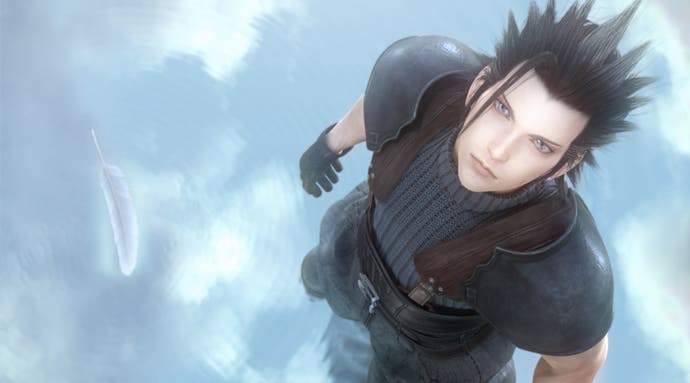Final Fantasy VII: Crisis Core
Cloud's silver lining?
Disenfranchised: no word better describes Final Fantasy VII's once-upon-a-time lovers. Where fans of the seminal RPG would once announce their devotion to the game with boldness, nowadays - outside of the dew-eyed cosplayers and fanfic writers - few would be so ready to admit this is a world and clutch of characters they once adored.
The reasons for this are myriad and complex but almost all relate to the fact that people and culture move on. Where once players were bowled over by Final Fantasy VII's record-breaking stats (3.28 million sales in Japan, 2.92m in North America and 1.77mi in Europe; two years' development time, 100+ team members; three PlayStation discs stuffed with 330 CG maps and 40 minutes of full-motion video to create the largest JRPG ever conceived) today these headlines are neither unique nor necessarily positive.
Where once the game's anime sensibilities seemed exotic and wonderful, in a post-Matrix world where black trench-coats, big swords and vacant-eyed sci-fi philosophy are utterly mainstream, now they seem over-familiar and unexciting. Cloud's solid poise and outlandish getup is no longer the cutting-edge of Japanese cool. The iconic CG still of antagonist Sephiroth striding off into the flames might have once made our hearts flutter, but now it only makes us blush a bit that we were so enamored by such obvious cliché.
But more than all of that, 9 million of us were fourteen, sixteen, eighteen-years-old when Final Fantasy VII exploded the sci-fi RPG into 3D Technicolor: everything was new and unbelievable, everything was changing and this game was the gateway to that future. And deeper than the showy aesthetics, these characters put pixels to the themes of identity and purpose many of us were struggling with at the time, while the fan culture provided a much-needed place to belong.
Now we're nearing our thirties and while these memories are dear, they also seem a little childish. This feeling has only been exacerbated by Square Enix's recent forays back onto Final Fantasy VII's hallowed ground via straight-to-UMD CGI movie Advent Children and the ill-advised J-FPS, Dirge of Cerberus. The shallow nature of these products served as a stark reminder that while we had grown up with this universe, this universe hadn't grown up with us. So Final Fantasy VII holds a place in our hearts as something we did when we were younger, something magical and transformative and important but something to be remembered and not interminably revisited. We are Final Fantasy VII fans: disenfranchised are we.

Crisis Core then, the final product in the 'Compilation of Final Fantasy VII' arrives on PSP with a strange kind of expectation upon its shoulders. For publisher Square Enix its job is to re-awaken disillusioned fans to this world, to exploit nostalgia, to fill out the back-story to the original game, attract newcomers and gloss over the mediocrity of its most recent follow-ups. For the fans who still play videogames and who still care enough to follow these things, it's probably the company's last chance to prove there's still value in elaborating the story and developing the mechanics.
It's clear right from the start-up sequence that with Crisis Core, Square Enix has made nostalgia top priority. Menu sound effects are copied and pasted from the PlayStation original, snatches of old melodies tug the ear before fluttering off into new places. The rich and recognisable iconography calls forth deep memories providing the overt fan satisfaction that's been mostly missing from the other spin-offs. As with the original, the game opens aboard a train that's racing towards the heart of the steam-punk city Midgar. It draws up to the station and lead protagonist Zack bounds onto the platform, step for step like Cloud. This fan service doesn't put a foot wrong until he reaches into his pocket, pulls out a mobile phone and speaks.


